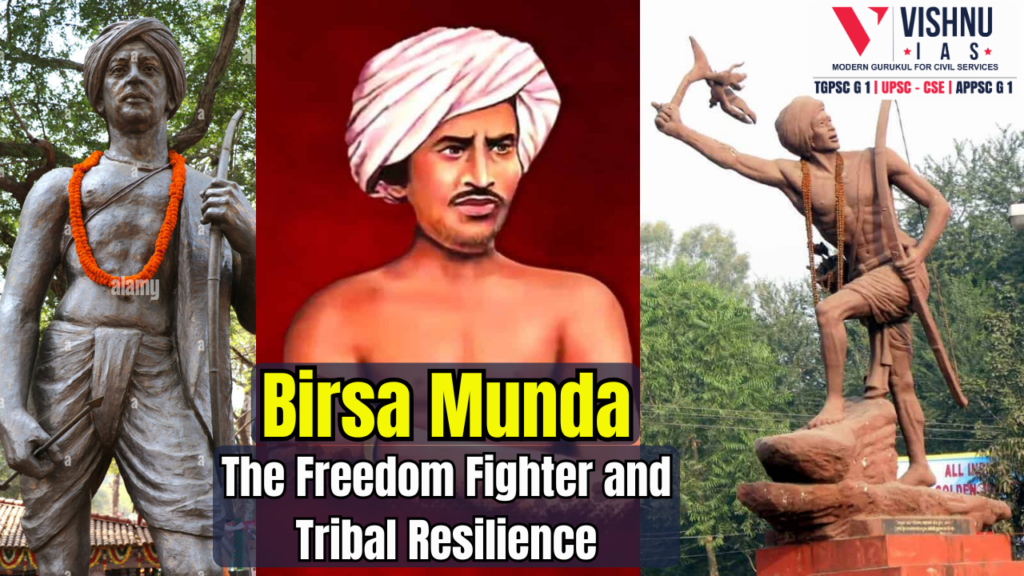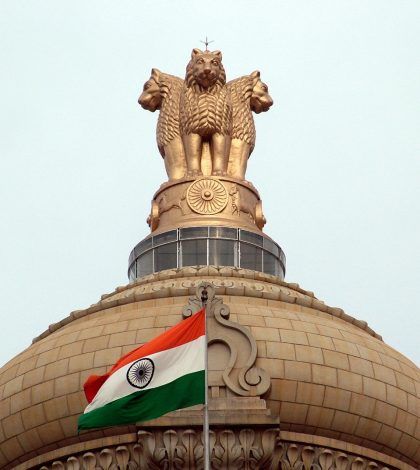Birsa Munda Biography
Approach
- Introduction: Write brief note on the freedom fighter Birsa Munda
- Body: add comprehensive detail about the life history of tribal activist and freedom fighter Birsa Munda and highlight his sacrifices towards tribal society?
- Conclusion: Conclude adequately
INTRODUCTION
Life History of Birsa Munda
Early Life
Birsa Munda was born on November 15, 1875, in the village of Ulihatu in the Khunti district of present-day Jharkhand, He belonged to the Munda tribe, a significant tribal community in the Chotanagpur plateau. His parents, Sugana Munda and Karmi Hatu, were agricultural labourers. Birsa’s early life was marked by poverty and frequent relocations as his family moved in search of work.
Education and Early Influences
Birsa received his early education at a local school in Salga under the guidance of Jaipal Nag. Later, he converted to Christianity to attend the German Mission School, but he soon realized that the British were using education as a tool for religious conversion. Disillusioned, he left the school and began to develop his own religious and social ideas.
Formation of Birsait Faith
Birsa Munda founded a new faith called Birsait, which emphasized the worship of a single god and the rejection of superstitious. His teachings attracted many followers from the Munda community, who began to identify themselves as Birsaits. This movement posed a significant challenge to the British authorities and Christian missionaries, as it fostered a sense of unity and resistance among the tribals.
The Munda Rebellion
The Munda Rebellion, also known as Ulgulan (The Great Tumult), was a significant uprising led by Birsa Munda against British colonial rule and the exploitative practices of landlords and moneylenders. The rebellion was sparked by the introduction of new land settlement systems like the zamindari system, which disrupted the traditional Khuntkatti system of communal land ownership. This led to widespread land alienation and forced labour among the tribals.
Birsa mobilized the Munda community to fight against these injustices. He advocated for the restoration of their traditional land rights and the establishment of Munda Raj (self-rule). The rebellion saw several violent clashes between the Mundas and the British forces. Despite being outnumbered and outgunned, Birsa’s leadership and the determination of his followers posed a significant threat to the colonial administration.
Arrest and Death
Birsa Munda was eventually captured by the British in February 1900. He was imprisoned in Ranchi Jail, where he died on June 9, 1900, under mysterious circumstances. His death at the young age of 24 marked the end of the Munda Rebellion, but his legacy lived on.
Impact of Birsa Munda’s Sacrifice on Tribal Society
Revival of Tribal Identity and Unity
Birsa Munda’s leadership and the Munda Rebellion played a crucial role in reviving the tribal identity and fostering a sense of unity among the tribal communities. His teachings and the Birsait faith provided a cultural and religious foundation that helped the tribals resist external influences and assert their identity.
Land Rights and Legal Reforms
The rebellion highlighted the issues of land alienation and exploitation faced by the tribals. In response to the uprising, the British government introduced the Chotanagpur Tenancy Act in 1908, which aimed to protect the land rights of the tribals and restrict the transfer of tribal land to non-tribals. This was a significant step towards addressing the grievances of the tribal communities and ensuring their rights over their ancestral lands.
Inspiration for Future Movements
Birsa Munda’s sacrifice and the Munda Rebellion inspired future generations of tribal leaders and activists. His legacy became a symbol of resistance against oppression and the fight for justice. The principles he stood for continued to influence various tribal movements across India, advocating for the rights and welfare of indigenous communities.
Recognition and Commemoration
Birsa Munda is revered as a national hero and a symbol of tribal resistance in India. His birth anniversary, November 15, is celebrated as Janjatiya Gaurav Diwas (Tribal Pride Day) to honour his contributions and the resilience of tribal communities. Numerous institutions, including universities and research centers, have been named after him to preserve and promote his legacy.
CONCLUSION
Birsa Munda’s life and sacrifice had a profound impact on tribal society in India. His efforts to unite the tribals, protect their land rights, and resist colonial oppression left an indelible mark on Indian history. Birsa’s legacy continues to inspire and empower tribal communities, reminding them of their rich cultural heritage and the importance of standing up for their rights.
Anthropology Full Course at Vishnu IAS Academy
What does Course Offer?
- 4 Months (250+ Class Hours)
- Online (App + Web) / Offline / Hybrid Mode of Classes
- Live + Recorded Videos Access For 1 Year
- 2 Hour Live Class From Monday to Saturday (1.5 Hours for Class + ½ Hour for Doubt Solving)
- Foundation to Advanced Level of Teaching
- Simple and Integrated Content
- One Stop Solution Books
- Regular Value Added Content
- Current Affairs & Case Studies Modules
- Daily Answer Writing Practice
- Weekly Grand Tests On Sundays & Evaluation With Guidance and Topper Will be Rewarded
- 500+ Model Answers
- 9 AM – 9 PM Support System
- Free GS Current Affairs
- Free Interview Guidance for Anthropology


